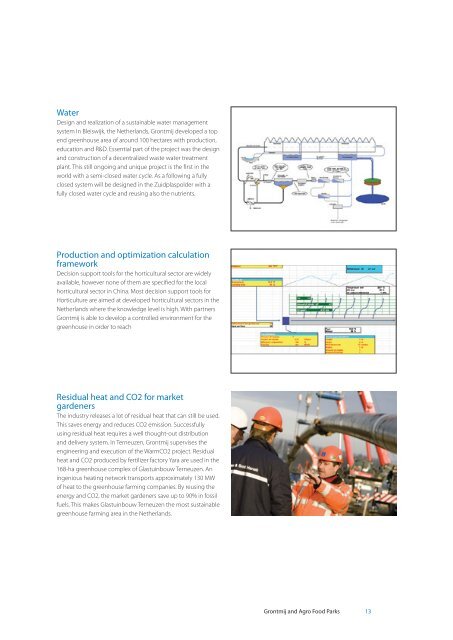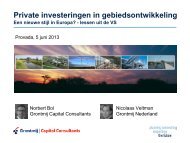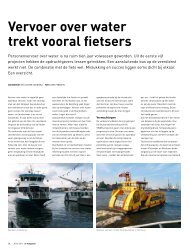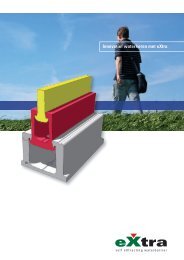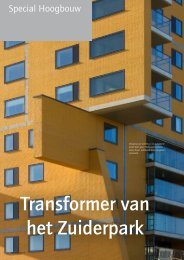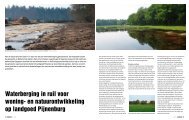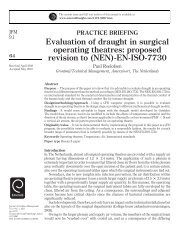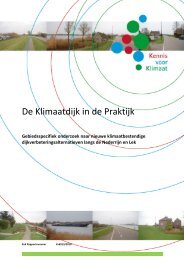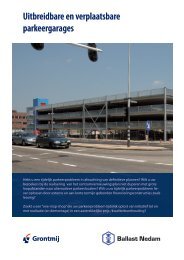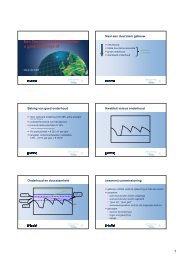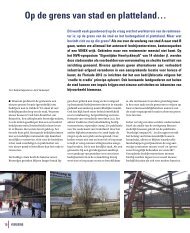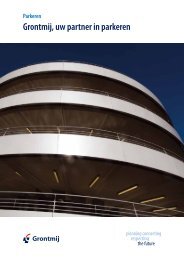Grontmij and Agro Food Parks
Grontmij and Agro Food Parks
Grontmij and Agro Food Parks
Create successful ePaper yourself
Turn your PDF publications into a flip-book with our unique Google optimized e-Paper software.
Water<br />
Design <strong>and</strong> realization of a sustainable water management<br />
system In Bleiswijk, the Netherl<strong>and</strong>s, <strong>Grontmij</strong> developed a top<br />
end greenhouse area of around 100 hectares with production,<br />
education <strong>and</strong> R&D. Essential part of the project was the design<br />
<strong>and</strong> construction of a decentralized waste water treatment<br />
plant. This still ongoing <strong>and</strong> unique project is the first in the<br />
world with a semi-closed water cycle. As a following a fully<br />
closed system will be designed in the Zuidplaspolder with a<br />
fully closed water cycle <strong>and</strong> reusing also the nutrients.<br />
Production <strong>and</strong> optimization calculation<br />
framework<br />
Decision support tools for the horticultural sector are widely<br />
available, however none of them are specified for the local<br />
horticultural sector in China. Most decision support tools for<br />
Horticulture are aimed at developed horticultural sectors in the<br />
Netherl<strong>and</strong>s where the knowledge level is high. With partners<br />
<strong>Grontmij</strong> is able to develop a controlled environment for the<br />
greenhouse in order to reach<br />
Residual heat <strong>and</strong> CO2 for market<br />
gardeners<br />
The industry releases a lot of residual heat that can still be used.<br />
This saves energy <strong>and</strong> reduces CO2 emission. Successfully<br />
using residual heat requires a well thought-out distribution<br />
<strong>and</strong> delivery system. In Terneuzen, <strong>Grontmij</strong> supervises the<br />
engineering <strong>and</strong> execution of the WarmCO2 project. Residual<br />
heat <strong>and</strong> CO2 produced by fertilizer factory Yara are used in the<br />
168-ha greenhouse complex of Glastuinbouw Terneuzen. An<br />
ingenious heating network transports approximately 130 MW<br />
of heat to the greenhouse farming companies. By reusing the<br />
energy <strong>and</strong> CO2, the market gardeners save up to 90% in fossil<br />
fuels. This makes Glastuinbouw Terneuzen the most sustainable<br />
greenhouse farming area in the Netherl<strong>and</strong>s.<br />
<strong>Grontmij</strong> <strong>and</strong> <strong>Agro</strong> <strong>Food</strong> <strong>Parks</strong> 13


